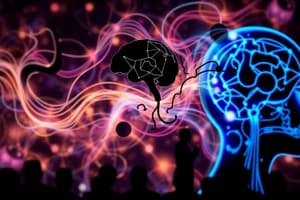Podcast
Questions and Answers
What term was coined by Floyd Allport in 1924?
What term was coined by Floyd Allport in 1924?
- Environmental influence theory
- Drive theory
- Social inhibition theory
- Social facilitation theory (correct)
Which of the following best describes the findings of Michaels et al. (1982) regarding pool players?
Which of the following best describes the findings of Michaels et al. (1982) regarding pool players?
- Expert players performed better with an audience. (correct)
- All players perform equally well in the presence of an audience.
- Expert players performed worse without an audience.
- Novice players performed better with an audience.
According to drive theory, what effect does arousal have on task performance?
According to drive theory, what effect does arousal have on task performance?
- Increases performance on all types of tasks.
- Facilitates performance of the dominant response. (correct)
- Inhibits performance of the dominant response.
- Does not affect performance in social situations.
What limitation is associated with drive theory?
What limitation is associated with drive theory?
How does Uziel's theory differentiate performance in social situations?
How does Uziel's theory differentiate performance in social situations?
In the context of social facilitation, what role does environmental influence play?
In the context of social facilitation, what role does environmental influence play?
Which statement reflects social inhibition?
Which statement reflects social inhibition?
Which of the following findings supports the concept of social facilitation?
Which of the following findings supports the concept of social facilitation?
What does interactionalism emphasize in understanding behavior?
What does interactionalism emphasize in understanding behavior?
How did Lewin's research contribute to social psychology?
How did Lewin's research contribute to social psychology?
What is a key criticism of behavioral psychology noted in the text?
What is a key criticism of behavioral psychology noted in the text?
What significant change occurred in social psychology during the 1960s and 70s?
What significant change occurred in social psychology during the 1960s and 70s?
Which study is associated with examining obedience in social psychology?
Which study is associated with examining obedience in social psychology?
What did Zimbardo's research primarily focus on?
What did Zimbardo's research primarily focus on?
Which of the following was a significant focus of Skinner's behaviorist approach?
Which of the following was a significant focus of Skinner's behaviorist approach?
What issue was raised regarding lab observations in social psychology research?
What issue was raised regarding lab observations in social psychology research?
What significant contribution did Wilhelm Wundt make to psychology in 1879?
What significant contribution did Wilhelm Wundt make to psychology in 1879?
Who is regarded as the father of social psychology, especially for his focus on individual dispositions?
Who is regarded as the father of social psychology, especially for his focus on individual dispositions?
What was a primary focus of research during WWII by social psychologists?
What was a primary focus of research during WWII by social psychologists?
Which theory did Norman Triplett establish in the field of social psychology?
Which theory did Norman Triplett establish in the field of social psychology?
What critique did Sumners make regarding intelligence testing?
What critique did Sumners make regarding intelligence testing?
What was a result of the Great Depression research conducted by Floyd Allport?
What was a result of the Great Depression research conducted by Floyd Allport?
What role did social psychology play regarding the Black Lives Matter Movement in recent research?
What role did social psychology play regarding the Black Lives Matter Movement in recent research?
Which event significantly shaped the development of social psychology in the West?
Which event significantly shaped the development of social psychology in the West?
What is a potential issue with small sample sizes in research?
What is a potential issue with small sample sizes in research?
Which of the following describes data dredging or p-hacking?
Which of the following describes data dredging or p-hacking?
What must be disclosed to participants after they are deceived in a social psychology experiment?
What must be disclosed to participants after they are deceived in a social psychology experiment?
What is a significant limitation of the priming experiments conducted by Lynott et al. 2014?
What is a significant limitation of the priming experiments conducted by Lynott et al. 2014?
Which of the following best represents the concern of conflict of interest in research?
Which of the following best represents the concern of conflict of interest in research?
What aspect of replication studies often raises questions about quality?
What aspect of replication studies often raises questions about quality?
Why is the concept of priming significant in psychology?
Why is the concept of priming significant in psychology?
Which of the following statements is true regarding effects not being universal?
Which of the following statements is true regarding effects not being universal?
What characteristic is associated with enhanced performance in social situations?
What characteristic is associated with enhanced performance in social situations?
What does the term 'Replication Crisis' refer to?
What does the term 'Replication Crisis' refer to?
Which statistical issue did WAGENMAKER et al. highlight regarding Daryl Bem's research?
Which statistical issue did WAGENMAKER et al. highlight regarding Daryl Bem's research?
What is involved in an exact replication study?
What is involved in an exact replication study?
What was one of the main findings from Galak and Nelson's efforts related to Daryl Bem's studies?
What was one of the main findings from Galak and Nelson's efforts related to Daryl Bem's studies?
Which of the following best describes individuals with negative social orientation?
Which of the following best describes individuals with negative social orientation?
What does the concept of 'liberal statistical demonstration' imply?
What does the concept of 'liberal statistical demonstration' imply?
What is one benefit of conducting replications in research?
What is one benefit of conducting replications in research?
What research methodology was predominant during the pluralism period from 1970-2000s?
What research methodology was predominant during the pluralism period from 1970-2000s?
What is the essence of social facilitation?
What is the essence of social facilitation?
Which theory suggests that riders are effectively shielded from the wind by the leading cyclist?
Which theory suggests that riders are effectively shielded from the wind by the leading cyclist?
Which of the following is NOT a psychological theory related to social facilitation?
Which of the following is NOT a psychological theory related to social facilitation?
Which ethical aspect was emphasized during the pluralism period?
Which ethical aspect was emphasized during the pluralism period?
According to Triplett's theories, which factor most directly affects competitive instincts?
According to Triplett's theories, which factor most directly affects competitive instincts?
What was a consequence of the focus on diverse participants in research during the pluralism period?
What was a consequence of the focus on diverse participants in research during the pluralism period?
Which psychological theory claims that observing other cyclists enhances performance through suggestion?
Which psychological theory claims that observing other cyclists enhances performance through suggestion?
Flashcards
Who founded social psychology?
Who founded social psychology?
Norman Triplett is considered the founder of social psychology. He wrote the first paper on the topic, which led to the development of the Social Facilitation Theory.
What is the focus of Social Facilitation Theory?
What is the focus of Social Facilitation Theory?
Social Facilitation Theory explores how the presence of others influences individual performance. Triplett observed that people cycle faster when others are around, suggesting social presence enhances task completion.
Who is considered the 'father' of social psychology?
Who is considered the 'father' of social psychology?
Floyd Allport is widely recognized as the father of social psychology. He emphasized the importance of individual dispositions and experimental methods to study social behavior.
What was the impact of World War II on social psychology?
What was the impact of World War II on social psychology?
Signup and view all the flashcards
What is the importance of Floyd Allport's work?
What is the importance of Floyd Allport's work?
Signup and view all the flashcards
Why were IQ tests criticized?
Why were IQ tests criticized?
Signup and view all the flashcards
How did early social psychologists understand society?
How did early social psychologists understand society?
Signup and view all the flashcards
What were the research areas during the 1930-1950s?
What were the research areas during the 1930-1950s?
Signup and view all the flashcards
Social Facilitation
Social Facilitation
Signup and view all the flashcards
Triplett's Experiment
Triplett's Experiment
Signup and view all the flashcards
Aerodynamic Theories
Aerodynamic Theories
Signup and view all the flashcards
Suction Theory
Suction Theory
Signup and view all the flashcards
Shelter Theory
Shelter Theory
Signup and view all the flashcards
Psychological Theories
Psychological Theories
Signup and view all the flashcards
Dynamogenic Theory
Dynamogenic Theory
Signup and view all the flashcards
Triplett's Theories
Triplett's Theories
Signup and view all the flashcards
Behaviorism
Behaviorism
Signup and view all the flashcards
Cognitive Revolution
Cognitive Revolution
Signup and view all the flashcards
Interactionalism
Interactionalism
Signup and view all the flashcards
Lewin's Contributions
Lewin's Contributions
Signup and view all the flashcards
Milgram's Experiment
Milgram's Experiment
Signup and view all the flashcards
Zimbardo's Experiment
Zimbardo's Experiment
Signup and view all the flashcards
Crisis in Social Psychology
Crisis in Social Psychology
Signup and view all the flashcards
Key Findings of the Cognitive Revolution
Key Findings of the Cognitive Revolution
Signup and view all the flashcards
Social Inhibition
Social Inhibition
Signup and view all the flashcards
Drive Theory (Social Facilitation)
Drive Theory (Social Facilitation)
Signup and view all the flashcards
Dominant Response
Dominant Response
Signup and view all the flashcards
Non-Dominant Response
Non-Dominant Response
Signup and view all the flashcards
Pool Player Example (Social Facilitation)
Pool Player Example (Social Facilitation)
Signup and view all the flashcards
Drive Theory Criticisms
Drive Theory Criticisms
Signup and view all the flashcards
Dispositional Factors
Dispositional Factors
Signup and view all the flashcards
Small Sample Size Problem
Small Sample Size Problem
Signup and view all the flashcards
Universal Effects?
Universal Effects?
Signup and view all the flashcards
Replication Issues
Replication Issues
Signup and view all the flashcards
P-Hacking
P-Hacking
Signup and view all the flashcards
Priming Theory
Priming Theory
Signup and view all the flashcards
Priming Experiment Example
Priming Experiment Example
Signup and view all the flashcards
Deception in Social Psychology
Deception in Social Psychology
Signup and view all the flashcards
Ethical Deception
Ethical Deception
Signup and view all the flashcards
Replication Crisis
Replication Crisis
Signup and view all the flashcards
Daryl Bem's ESP Experiments
Daryl Bem's ESP Experiments
Signup and view all the flashcards
Liberal Statistical Analysis
Liberal Statistical Analysis
Signup and view all the flashcards
Why Are Replications Important?
Why Are Replications Important?
Signup and view all the flashcards
Direct Replication
Direct Replication
Signup and view all the flashcards
The Importance of Personality and Social Orientation
The Importance of Personality and Social Orientation
Signup and view all the flashcards
Study Notes
History of Social Psychology
- Aristotle believed society shapes human development
- Comte argued that people are the consequence and producers of social environments
- 1879: Wilhelm Wundt established the first psychology lab, separating it from philosophy and biology
- 1898: Norman Triplett started social psychology and wrote the first paper on Social Facilitation Theory.
- John Dewey suggested that collectivist work benefits society as a whole
- 1908: McDougall published the first Social Psychology textbook
- 1920-1930: Floyd Allport, considered the father of social psychology and experimental psychology, focused on individual dispositions within society, and researched the impact of the Great Depression on communities.
- Sumner's work on IQ tests with African Americans is noteworthy, with a focus on criticism of the Western scale and its application to different cultures.
1930-1950s
- World War II significantly impacted social psychology, especially in the West. Studies on conformity, obedience, and authority figures gained popularity.
- Psychologists became more interested in applying their understanding of individual influence in war-related issues such as military recruitment.
Global Events
- Research into the psychological consequences of war (e.g., in Ukraine) and other significant global events (e.g., Black Lives Matter movement) are investigated.
1960s-1970s
- Milgram's prison experiments and Zimbardo's obedience simulation are prominent examples of social psychological research.
- Questions arose about the ethical treatment of participants in research studies, as well as whether lab observations apply to real life
1970s-2000s
- Social psychology moved towards pluralism merging lab research with correlational research.
- Field studies, inclusion of diverse participants and cultures and ethical standards were also important for this period.
Social Facilitation
- Norman Triplett's research, focusing on bicycle racers, is an early example of social facilitation.
- Other theories include:
- Aerodynamic theories (suction and shelter theory)
- Psychological theories (hypnotism, encouragement, brain worry, and automatic theory)
- Floyd Allport coined the term "social facilitation"
- Studies showed that individuals performed tasks better with others than alone (e.g., fishing line test, ants, chickens)
Social Inhibition and Drive Theory
- Social inhibition, where performance decreases in the presence of others, is investigated.
- Robert Zajonc's drive theory suggests that arousal (generated by the presence of others) affects performance in different ways depending on the task (easy or difficult)
Priming Theory
- Priming theory suggests that exposure to one stimulus can influence the response to a subsequent stimulus without conscious awareness.
- This theory has gained considerable attention in social psychology.
Deception in Social Psychological Experiments
- Ethical considerations in research involving deception are highlighted.
Ways to Improve Research
- Methods for improving research reliability and reproducibility and to protect against researcher biases are explored.
- Key areas include transparency, clear methodology, and large sample sizes to minimise chance occurrences and the impact of specific events.
Replication Crisis
- Concerns about the reproducibility of research findings led to a replication crisis in social psychology(and other disciplines).
- Issues such as data falsification, low statistical power, and small sample sizes were noted.
- Daryl Bem's work highlighting ESP is a well-known example, but others challenged the validity of the data analysis, leading to a significant questioning of findings across different methodologies.
Individual and Dispositional Factors
- Uziel's theory suggests that personality factors (positive or negative orientations towards social situations) influence social facilitation, rather than the environment.
Studying That Suits You
Use AI to generate personalized quizzes and flashcards to suit your learning preferences.




